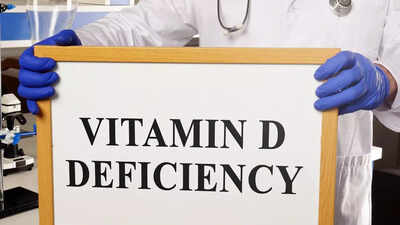 Vitamin D is a vital nutrient that supports many aspects of health, from bone strength and muscle function to immunity and mood regulation. When your vitamin D levels are low, it can affect multiple systems in your body, often in subtle ways that are easy to overlook. Deficiency can result from limited sun exposure, poor dietary intake, or medical conditions that impair absorption. Symptoms may include fatigue, frequent illness, muscle weakness, or even mood changes. Recognising these early signs and addressing the deficiency through diet, supplements, or sunlight can help prevent long-term health complications and improve overall well-being.
Vitamin D is a vital nutrient that supports many aspects of health, from bone strength and muscle function to immunity and mood regulation. When your vitamin D levels are low, it can affect multiple systems in your body, often in subtle ways that are easy to overlook. Deficiency can result from limited sun exposure, poor dietary intake, or medical conditions that impair absorption. Symptoms may include fatigue, frequent illness, muscle weakness, or even mood changes. Recognising these early signs and addressing the deficiency through diet, supplements, or sunlight can help prevent long-term health complications and improve overall well-being.
What happens when your vitamin D is low: 10 signs to watch
Fatigue and tiredness
 One of the earliest signs of low vitamin D is persistent fatigue. Vitamin D helps your body maintain energy by supporting muscle function and overall cellular activity. When levels are insufficient, cells may not function optimally, leading to feelings of tiredness even after adequate sleep. Correcting the deficiency through supplements or sunlight exposure can often help restore energy levels. A study published in the Journal Nutrients found that individuals with low vitamin D levels reported higher levels of fatigue and poorer sleep quality. Supplementation with vitamin D improved energy levels and sleep patterns in these individuals.
One of the earliest signs of low vitamin D is persistent fatigue. Vitamin D helps your body maintain energy by supporting muscle function and overall cellular activity. When levels are insufficient, cells may not function optimally, leading to feelings of tiredness even after adequate sleep. Correcting the deficiency through supplements or sunlight exposure can often help restore energy levels. A study published in the Journal Nutrients found that individuals with low vitamin D levels reported higher levels of fatigue and poorer sleep quality. Supplementation with vitamin D improved energy levels and sleep patterns in these individuals.
Frequent illness
Vitamin D is essential for a strong immune system. Low levels can weaken your body’s ability to fight infections, making you more prone to colds, flu, or respiratory illnesses. Studies have linked vitamin D deficiency to higher disease severity in intensive care patients and increased susceptibility to viral infections like COVID-19. Ensuring adequate vitamin D helps your immune cells respond effectively to pathogens.
Muscle weakness and pain
Vitamin D plays a vital role in muscle strength and coordination. Research published in StatPearls notes that insufficient vitamin D levels may lead to muscle weakness, increasing the risk of falls, especially in older adults. Without enough of it, muscles may feel weak or sore, and you could experience cramps or difficulty performing everyday activities. This is because vitamin D regulates calcium and phosphorus in muscle tissues, which are essential for contraction and repair. Low levels also increase the risk of falls, particularly in older adults.
Back pain
 Chronic back pain can be linked to low vitamin D levels. Vitamin D deficiency can weaken bones and muscles, placing extra strain on the spine. Low bone density increases the risk of spinal stress and micro-fractures, especially in the lower back. Supplementing vitamin D in deficient individuals has been shown to help reduce pain in some cases, particularly when combined with calcium.
Chronic back pain can be linked to low vitamin D levels. Vitamin D deficiency can weaken bones and muscles, placing extra strain on the spine. Low bone density increases the risk of spinal stress and micro-fractures, especially in the lower back. Supplementing vitamin D in deficient individuals has been shown to help reduce pain in some cases, particularly when combined with calcium.
Bone fractures and osteoporosis
Vitamin D is necessary for calcium absorption and maintaining bone density. Deficiency can lead to soft bones (osteomalacia) and contribute to osteoporosis, which increases fracture risk. Adults with low vitamin D may experience unexpected fractures even from minor falls or bumps. Maintaining adequate levels strengthens bones and reduces the likelihood of injury.
Hair loss
Vitamin D influences hair follicle health and the hair growth cycle. Low vitamin D can slow hair regeneration, leading to thinning or hair loss. Conditions like alopecia areata, an autoimmune disorder, are associated with low vitamin D levels, and treatments that include supplementation have shown improvement in hair regrowth. Adequate vitamin D ensures proper follicle function and healthy hair growth.
Depression and mood changes
Vitamin D affects brain function and the regulation of neurotransmitters, which influence mood. Deficiency has been linked to a higher risk of depression and mood swings. Low levels can affect serotonin production, which may lead to feelings of sadness or lethargy. Restoring vitamin D levels may support emotional well-being alongside other therapies.
Weight gain
Low vitamin D is associated with increased fat storage. Vitamin D is stored in fat cells, which can prevent it from circulating in the blood efficiently. People with obesity are more likely to have low blood levels of vitamin D. This deficiency can affect metabolism, potentially making weight management more challenging and contributing to further fat accumulation.
Eczema and skin issues
Vitamin D supports skin barrier function and immune response. A deficiency can worsen chronic skin conditions like eczema, leading to irritation, inflammation, and flare-ups. Adequate vitamin D helps regulate immune responses in the skin and improves its ability to repair and protect itself against environmental triggers.
Slow wound healing
Vitamin D plays a role in tissue repair and immunity. Low levels can delay the healing process for cuts, scrapes, or surgical wounds. Without sufficient vitamin D, immune cells are less effective at controlling infection and supporting tissue regeneration, making recovery slower and increasing the risk of complications.Disclaimer: This article is for general informational purposes only and is not a substitute for professional medical advice, diagnosis, or treatment. Always seek the guidance of a qualified healthcare provider regarding any medical condition or lifestyle change.Also Read: What happens to your senses as you near death: The science explained

